20 start with R start with R


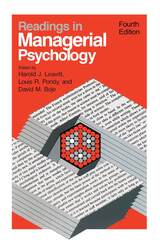
Readings in Managerial Psychology is designed for managers in business and industry, students of management, public and university administrators, and executives in other organizations. The collection can be used independently or as a companion volume to Harold J. Leavitt and Homa Bahrami's Managerial Psychology: Managing Behavior in Organizations (5th edition, 1988), also published by the University of Chicago Press.
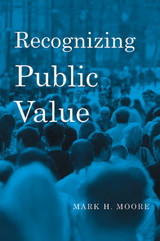
Mark H. Moore’s now classic Creating Public Value offered advice to public managers about how to create public value. But that book left a key question unresolved: how could one recognize (in an accounting sense) when public value had been created? Here, Moore closes the gap by setting forth a philosophy of performance measurement that will help public managers name, observe, and sometimes count the value they produce, whether in education, public health, safety, crime prevention, housing, or other areas. Blending case studies with theory, he argues that private sector models built on customer satisfaction and the bottom line cannot be transferred to government agencies. The Public Value Account (PVA), which Moore develops as an alternative, outlines the values that citizens want to see produced by, and reflected in, agency operations. These include the achievement of collectively defined missions, the fairness with which agencies operate, and the satisfaction of clients and other stake-holders.
But strategic public managers also have to imagine and execute strategies that sustain or increase the value they create into the future. To help public managers with that task, Moore offers a Public Value Scorecard that focuses on the actions necessary to build legitimacy and support for the envisioned value, and on the innovations that have to be made in existing operational capacity.
Using his scorecard, Moore evaluates the real-world management strategies of such former public managers as D.C. Mayor Anthony Williams, NYPD Commissioner William Bratton, and Commissioner of the Minnesota Department of Revenue John James.





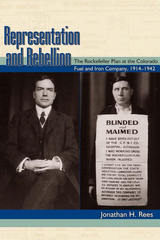
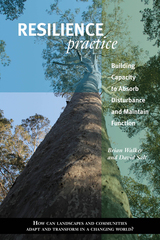
In Resilience Practice, authors Brian Walker and David Salt take the notion of resilience one step further, applying resilience thinking to real-world situations and exploring how systems can be managed to promote and sustain resilience.
The book begins with an overview and introduction to resilience thinking and then takes the reader through the process of describing systems, assessing their resilience, and intervening as appropriate. Following each chapter is a case study of a different type of social-ecological system and how resilience makes a difference to that system in practice. The final chapters explore resilience in other arenas, including on a global scale.
Resilience Practice will help people with an interest in the “coping capacity” of systems—from farms and catchments to regions and nations—to better understand how resilience thinking can be put into practice. It offers an easy-to-read but scientifically robust guide through the real-world application of the concept of resilience and is a must read for anyone concerned with the management of systems at any scale.
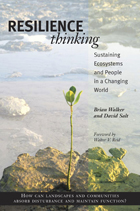
"Resilience thinking" offers a different way of understanding the world and a new approach to managing resources. It embraces human and natural systems as complex entities continually adapting through cycles of change, and seeks to understand the qualities of a system that must be maintained or enhanced in order to achieve sustainability. It explains why greater efficiency by itself cannot solve resource problems and offers a constructive alternative that opens up options rather than closing them down.
In Resilience Thinking, scientist Brian Walker and science writer David Salt present an accessible introduction to the emerging paradigm of resilience. The book arose out of appeals from colleagues in science and industry for a plainly written account of what resilience is all about and how a resilience approach differs from current practices. Rather than complicated theory, the book offers a conceptual overview along with five case studies of resilience thinking in the real world. It is an engaging and important work for anyone interested in managing risk in a complex world.

Resilient by Design provides business executives with a comprehensive approach to achieving consistent success in a changing world. Rich with examples and case studies of organizations that are designing resilience into their business processes, it explains how to connect with important external systems—stakeholders, communities, infrastructure, supply chains, and natural resources—and create innovative, dynamic organizations that survive and prosper under any circumstances.
Resilient enterprises continue to grow and evolve in order to meet the needs and expectations of their shareholders and stakeholders. They adapt successfully to turbulence by anticipating disruptive changes, recognizing new business opportunities, building strong relationships, and designing resilient assets, products, and processes. Written by one of the leading experts in enterprise resilience and sustainability, Resilient by Design offers a confident path forward in a world that is increasingly less certain.

Contract management is a critical skill for all contemporary public managers. As more government duties are contracted out, managers must learn to coordinate and measure the performance of private contractors, and to write contract requirements and elicit bids that obtain important services and products at the best possible price and quality. They must also learn to work in teams that include both public and private sector partners.
The Responsible Contract Manager delves into the issues of how to ensure that the work done by private sector contractors serves the public interest and argues for the necessity of making these organizations act as extensions of the public sector while maintaining their private character. Government contract managers have a unique burden because they must develop practices that ensure the production advantages of networked organizations and the transparency and accountability required of the public sector.
The Responsible Contract Manager fills a major gap in public management literature by providing a clear and practical introduction to the best practices of contract management and also includes a discussion of public ethics, governance and representation theory. It is an essential guide for all public management scholars and is especially useful for students in MPA graduate programs and related fields.
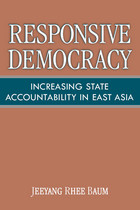
"Responsive Democracy is a pioneering contribution to the political analysis of administrative law in East Asia. Both political scientists and legal academics will greatly benefit from the author's in-depth analysis of the intersection between presidential power and administrative law in the contrasting cases of South Korea, Taiwan, and the Philippines."
---Susan Rose-Ackerman, Yale University Law School
"Baum's book is a very significant contribution because it focuses on a part of the world that has often been neglected in studies of democratization. It focuses attention on the nuts and bolts of what we mean by democratic consolidation and responsiveness. Indeed, if more political science were written with this clarity, we would all enjoy reading the literature much more!"
---Joseph Fewsmith, Boston University
Under what conditions is a newly democratic government likely to increase transparency, accountability, and responsiveness to its citizens? What incentives might there be for bureaucrats, including those appointed by a previously authoritarian government, to carry out the wishes of an emerging democratic regime? Responsive Democracy addresses an important problem in democratic transition and consolidation: the ability of the chief executive to control the state bureaucracy.
Using three well-chosen case studies---the Philippines, South Korea, and Taiwan---Jeeyang Rhee Baum explores the causes and consequences of codifying rules and procedures in a newly democratic government. In the Philippines, a president facing opposition has the option of appointing and dismissing officials at will and, therefore, has no need for administrative procedure acts. However, in South Korea and Taiwan, presidents employ such legislation to rein in recalcitrant government agencies, and, as a consequence, increase transparency, accountability, and responsiveness. Moreover, as Baum demonstrates by drawing upon surveys conducted both before and after implementation, administrative procedural reforms in South Korea and Taiwan improved public confidence in and attitudes toward democratic institutions.
Jeeyang Rhee Baum is a Research Fellow at the Ash Center for Democratic Governance and Innovation, John F. Kennedy School of Government, Harvard University.
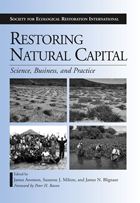
Restoring Natural Capital brings together economists and ecologists, theoreticians, practitioners, policy makers, and scientists from the developed and developing worlds to consider the costs and benefits of repairing ecosystem goods and services in natural and socioecological systems. It examines the business and practice of restoring natural capital, and seeks to establish common ground between economists and ecologists with respect to the restoration of degraded ecosystems and landscapes and the still broader task of restoring natural capital. The book focuses on developing strategies that can achieve the best outcomes in the shortest amount of time as it:
• considers conceptual and theoretical issues from both an economic
and ecological perspective
• examines specific strategies to foster the restoration of natural
capital and offers a synthesis and a vision of the way forward
Nineteen case studies from around the world illustrate challenges and achievements in setting targets, refining approaches to finding and implementing restoration projects, and using restoration of natural capital as an economic opportunity. Throughout, contributors make the case that the restoration of natural capital requires close collaboration among scientists from across disciplines as well as local people, and when successfully executed represents a practical, realistic, and essential tool for achieving lasting sustainable development.



The toxic legacy of Love Canal vividly brought the crisis in industrial waste disposal to public awareness across the United States and led to the passage of the Superfund legislation in 1980. To discover why disasters like Love Canal have occurred and whether they could have been averted with knowledge available to waste managers of the time, this book examines industrial waste disposal before the formation of the Environmental Protection Agency in 1970.
Colten and Skinner build their study around three key questions. First, what was known before 1970 about the hazards of certain industrial wastes and their potential for causing public health problems? Second, what were the technical capabilities for treating or containing wastes during that time? And third, what factors other than technical knowledge guided the actions of waste managers before the enactment of explicit federal laws?
The authors find that significant information about the hazards of industrial wastes existed before 1970. Their explanations of why this knowledge did not prevent the toxic legacy now facing us will be essential reading for environmental historians and lawyers, public health personnel, and concerned citizens.
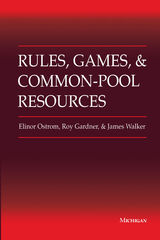
READERS
Browse our collection.
PUBLISHERS
See BiblioVault's publisher services.
STUDENT SERVICES
Files for college accessibility offices.
UChicago Accessibility Resources
home | accessibility | search | about | contact us
BiblioVault ® 2001 - 2024
The University of Chicago Press









